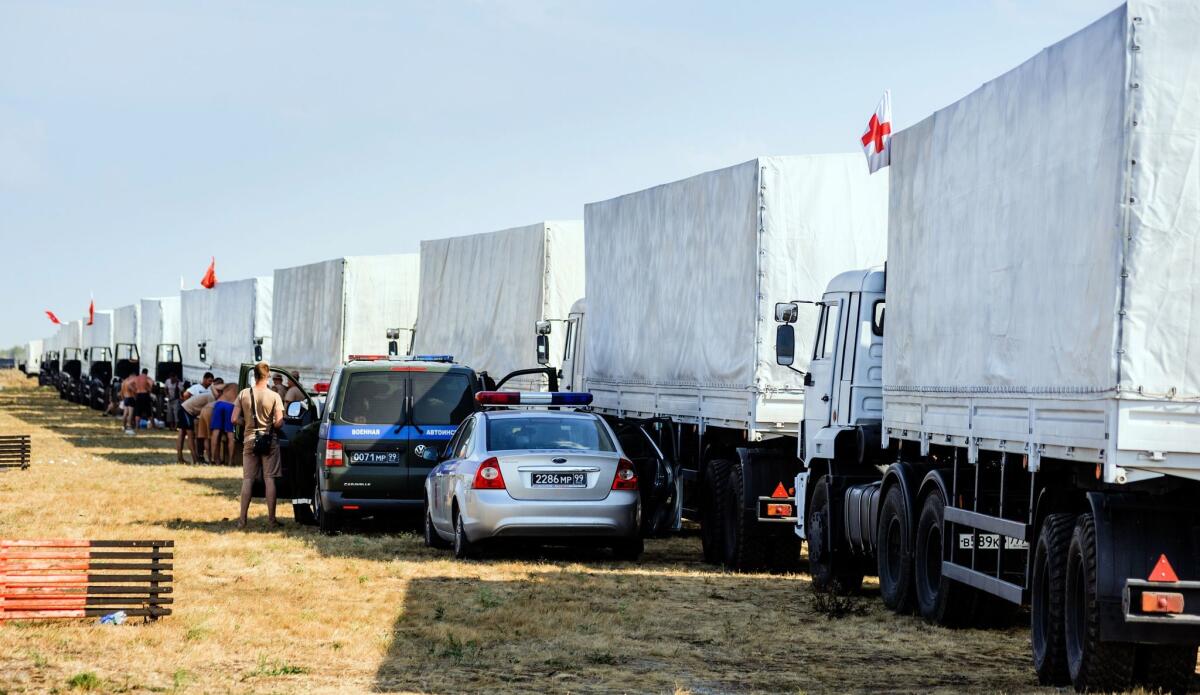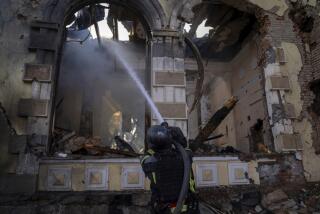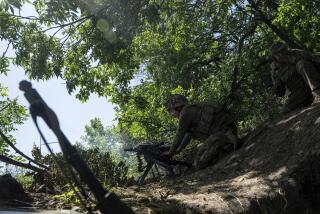Standoff ensues over Russian aid convoy for eastern Ukraine

As a standoff ensued between Russia and Ukraine over a massive aid convoy dispatched from Moscow, the United Nations on Wednesday sharply increased its estimate of the death toll from four months’ of fighting in eastern Ukraine.
A spokeswoman for the U.N. human rights office in Geneva said the number of dead from the Donetsk and Luhansk conflict zones had nearly doubled over the past two weeks as Ukrainian government forces close in on the pro-Russia separatists’ last strongholds.
Fighting has intensified and knocked out power, water and communications to much of the remaining separatist-held territory, leaving civilians who did not evacuate in dramatically deteriorating conditions.
Russia on Tuesday dispatched a 280-truck convoy said to be carrying food, water, medicine and generators for those trapped in Luhansk, with Kremlin leaders saying they had agreed on the details of transit and delivery with the Ukrainian government in Kiev.
But a key condition set by the Kiev leadership was that the relief goods be transported through Ukrainian territory under escort by the International Committee of the Red Cross and in vehicles owned or leased by the Swiss-based aid agency.
Ukrainian President Petro Poroshenko earlier had rejected the Kremlin’s attempt to send Russian aid to the region held by pro-Russia separatists but relented Monday when Russia agreed to an international relief mission under ICRC auspices and escort.
Laurent Corbaz, head of Red Cross operations for Europe and Central Asia, said Tuesday that he had yet to receive a cargo manifest or distribution plan from Moscow, nor had the agency received credible assurances from either Russia or Ukraine that its employees could travel safely through the battle zones.
Ukrainian Interior Minister Arsen Avakov posted a statement on his Facebook page on Wednesday calling the Russian aid mission a “cynical provocation” by Russian aggressors.
“No Putin ‘humanitarian convoy’ will be permitted to travel through the territory of Kharkiv region,” Avakov said, referring to the route through government-controlled territory north of the conflict areas that Kiev has said must be conducted by the Red Cross, not Russia.
Avakov’s statement prompted a flurry of Russian media declarations that Ukraine was blocking the aid destined for the desperate holdouts in Luhansk, where many of the 200,000 living there have gone without water and power for more than a week.
“Ukraine will block border entry to Russia’s humanitarian aid convoy,” the Itar-Tass news agency reported, citing Avakov.
RIA Novosti stated: “Ukraine has no plans to allow a convoy of Russian humanitarian aid to cross through the Kharkiv Region.”
Britain’s BBC television reported that the convoy had pulled up near Voronezh, about 185 miles from the Ukrainian border, to wait while authorities sorted out the entry and inspection details.
Kiev officials have derided the Russian relief mission as a public relations gesture to alleviate suffering inflicted by Kremlin-backed insurgents inspired by Russian President Vladimir Putin’s annexation of Ukraine’s Crimea region in March. Some fear the convoy may be a Trojan Horse, carrying arms and military personnel to shore up the separatists’ flagging rebellion.
In Geneva, spokeswoman Cecile Pouilly of the U.N. Office of the High Commissioner for Human Rights said world body officials now conservatively calculate that 2,086 people have died in eastern Ukraine hostilities since mid-April. That is near double the 1,129 death toll reported by the rights office on July 26 and indicates “a clear escalating trend,” Pouilly told reporters.
Follow @cjwilliamslat for the latest international news 24/7
More to Read
Start your day right
Sign up for Essential California for news, features and recommendations from the L.A. Times and beyond in your inbox six days a week.
You may occasionally receive promotional content from the Los Angeles Times.







